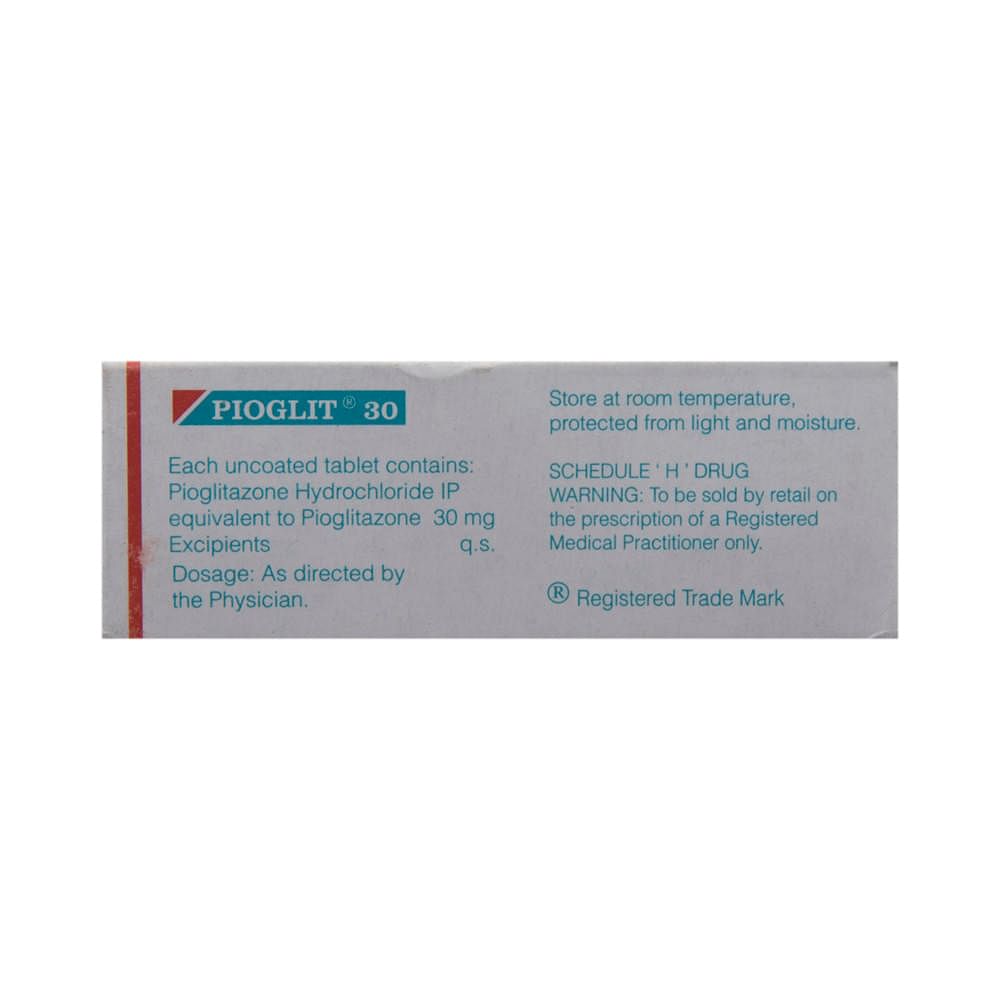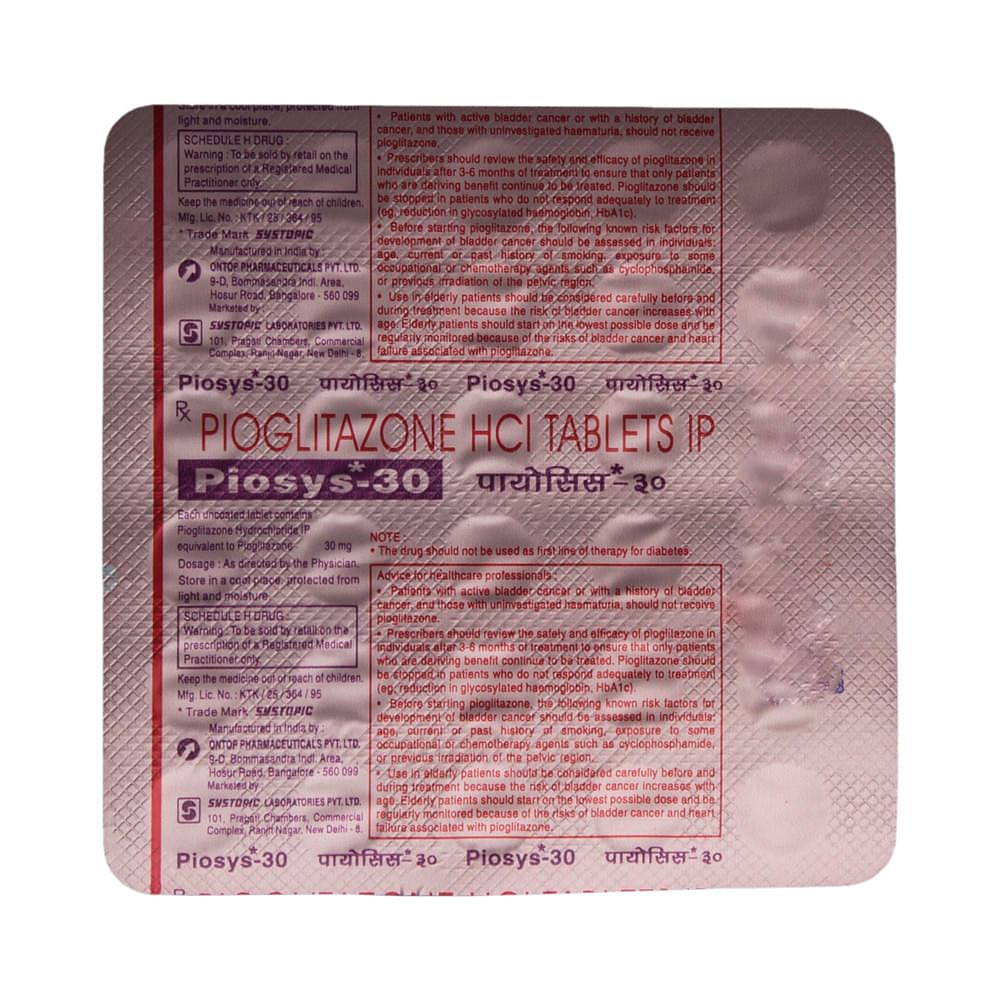
Piomerc 30mg Tablet
Manufacturer
AN Pharmaceuticals Pvt Ltd
Salt Composition
Pioglitazone (30mg)
Key Information
Short Description
Piomerc 30mg Tablet is a medicine used to treat type 2 diabetes mellitus in adults. It helps control blood sugar levels in people with diabetes.
Dosage Form
Tablet
Introduction
Piomerc 30mg Tablet may be used by itself or along with other medicines. It may be taken with or without food. Take it regularly at the same time each day to get the most benefit. Your doctor will decide what dose is best for you and this may change from time to time according to how it is working. Keep taking this medicine, even if you feel well or your blood sugar levels are controlled. If you stop it without consulting your doctor, your blood sugar levels could rise and put you at risk of kidney damage, blindness, nerve problems, and loss of limbs. Remember that it is only part of a treatment program that should also include a healthy diet, regular exercise, and weight reduction as advised by your doctor. Your lifestyle plays a big part in controlling diabetes.
Directions for Use
Take this medicine in the dose and duration as advised by your doctor. Swallow it as a whole. Do not chew, crush or break it. Piomerc 30mg Tablet may be taken with or without food, but it is better to take it at a fixed time.
How it works
Piomerc 30mg Tablet is an anti-diabetic medication. It works by increasing the body's sensitivity to insulin, a natural substance that helps control blood sugar levels.
Quick Tips
Piomerc 30mg Tablet helps to control blood sugar level and avoid long-term complications. Take it only as per dose and duration suggested by your doctor. You should continue to exercise regularly, eat a healthy diet, and take your other diabetes medicines along with Piomerc 30mg Tablet. Full effects may be visible after several weeks of starting Piomerc 30mg Tablet. Keep taking it as prescribed by your doctor. Monitor your blood sugar level regularly while taking this medicine. Notify your doctor if you experience shortness of breath, heart problems, or any abnormal swelling.
Related Medicines

Pioz 30 Tablet

Pioglit 30 Tablet

Piosys-30 Tablet

Pionorm-30 Tablet

Path 30 Tablet

Piotag 30mg Tablet

Cureglit 30mg Tablet

Piosenz 30mg Tablet

Opam 30mg Tablet

Pioglico Tablet
Frequently asked questions
Can Pioglitazone (Piomerc) cause weight gain?
Yes, Pioglitazone (Piomerc) can cause weight gain, which may be dose-related. Weight gain could be due to fat accumulation or water retention in the body, especially in patients with heart failure. It's essential to monitor weight in these cases.
Can Pioglitazone (Piomerc) worsen heart failure?
Yes, Pioglitazone (Piomerc) can cause fluid retention, which may aggravate or speed up heart failure. The doctor usually starts with the lowest available dose and increases it gradually while treating patients who have at least one risk factor for heart failure (previous heart attack, coronary artery disease, elderly). Heart failure is more common when Pioglitazone (Piomerc) is used with insulin.
Can I take Pioglitazone (Piomerc) and metformin together?
Yes, Pioglitazone (Piomerc) can be used with metformin where sufficient blood sugar management was not possible with metformin alone. This combination of medicines can be used in adult patients with type 2 diabetes mellitus and overweight patients with poor blood sugar control.
What is the recommended dosage time for Pioglitazone (Piomerc)?
It's usually prescribed once daily and can be taken at any time of day but preferably at the same time each day. It can be taken with or without food. You should take Pioglitazone (Piomerc) exactly as prescribed by your doctor.
How long do I need to take Pioglitazone (Piomerc)? Can I stop the medicine for some time?
Continue taking Pioglitazone (Piomerc) as long as your doctor recommends taking it. Treatment for diabetes mellitus is long-term, so you may have to take it lifelong. However, if you have to stop it then consult with your doctor who will suggest an alternative. Do not stop taking it without consulting your doctor as it may cause blood sugar levels to rise, which could be harmful to you.
Does Pioglitazone (Piomerc) affect liver function?
Yes, Pioglitazone (Piomerc) may cause an increase in liver enzymes. Treatment with Pioglitazone (Piomerc) should be stopped if liver enzymes increase. Hence, levels of liver enzymes should be periodically checked while on treatment with this medicine. Pioglitazone (Piomerc) should not be prescribed to patients with liver disease.
What kind of medication is Pioglitazone (Piomerc)? Is it like metformin?
Pioglitazone (Piomerc) belongs to the thiazolidinediones class of anti-diabetic medicines. It helps control blood sugar levels by improving how your body uses a hormone called insulin. This is done by helping your cells become more sensitive to the insulin your body makes.
Can Pioglitazone (Piomerc) increase the risk of bladder cancer?
Yes, Pioglitazone (Piomerc) may increase the risk of bladder cancer, though it is very rare. Immediately consult your doctor if you experience blood in your urine, pain when urinating or a sudden need to urinate, during treatment with this medicine. Pioglitazone (Piomerc) should not be used in patients with a prior history of bladder cancer or having bladder cancer.


